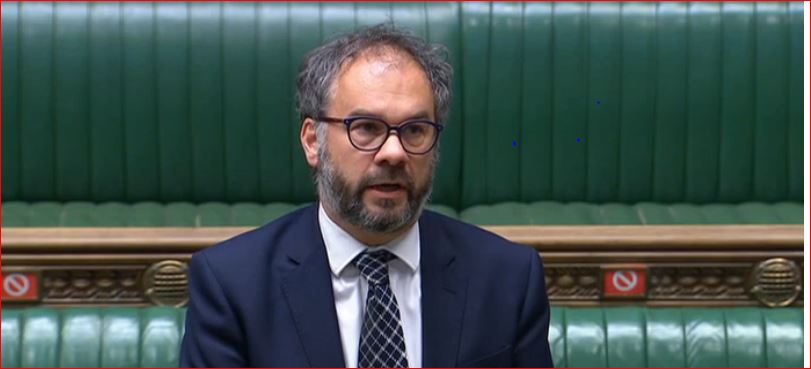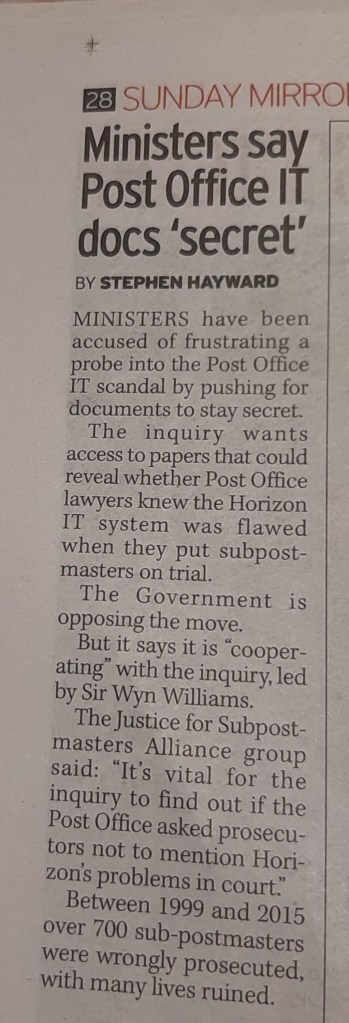by Tony Collins
Ministers have been accused of frustrating a public inquiry into the Post Office IT scandal by pushing for legal documents relating to civil and criminal cases to be kept secret.
The Sunday Mirror reported yesterday that the government opposes a move by the inquiry to see documents that could reveal whether the Post Office’s lawyers knew of Horizon’s flaws when they put sub-postmasters on trial.
Between 1999 and 2015, more than 700 sub-postmasters and sub-postmistresses were prosecuted on the basis of data from the Post Office’s flawed Horizon branch accounting system which was supplied and maintained by Fujitsu.
The prosecution case was, in part, that Horizon could be trusted when its data showed money was missing from the accounts of branch post offices. Prosecutors accused sub-postmasters of fiddling the books or stealing the money, although investigators had found nothing untoward when they checked sub-postmasters’ lifestyles, bank account and home. Judges and juries accepted the prosecution case. Some innocent defendants were imprisoned, some given community service. Some victims of the scandal went bankrupt and some have since died while awaiting justice. None of the courts required prosecutors to prove Horizon’s integrity.
New cover-up?
Criminal and civil cases were at the heart of the scandal. But Whitehall officials, with the support of government ministers, have sought to keep court-related matters at the margins of the Horizon inquiry. At first, business minister Paul Scully and his colleagues tried to stop the inquiry from investigating any matter relating to the Post Office’s prosecution function. Indeed, the business department, BEIS, excluded prosecution matters from the inquiry’s original terms of reference. This specific exclusion was later dropped.

But now BEIS has asked the inquiry’s chairman, retired judge Sir Wyn Williams, not to investigate legal advice relating to individual civil and criminal cases. BEIS’s submission to Sir Wyn said last week,
“… the Department submits that it is not necessary to, and the Inquiry should not proactively, investigate legal advice received in relation to individual civil and criminal cases. This is likely to be immensely time-consuming, and is tangential to and unlikely materially to assist in resolving the issues with which the Inquiry is concerned as per its Terms of Reference.
“The Department also observes that other fora are better suited to identifying and resolving specific failings – including negligent or improper legal advice – in individual cases.”
This part of the BEIS submission to Sir Wyn has prompted accusations that the current government wants a new cover-up of possible misconduct by prosecutors or improper legal advice. The business department has already participated in a 20-year cover-up of Horizon’s defects and security weaknesses.
Post Office submission to the inquiry
The Post Office’s submission to the Williams inquiry also raises a question of whether it will suppress legal emails and documents. The Post Office is said to be reforming itself in the light of the scandal. But is it set to join BEIS in a new cover-up? The Post Office’s submission to the Williams inquiry warns that it cannot be forced to disclose legally-privileged documents.
Says the Post Office in its submission to the inquiry,
“… Section 22 of the Inquiries Act 2005 expressly provides that there is no power to compel the disclosure of evidence or documents which are the subject of legal professional privilege, reflecting the fundamental right of confidence in communications
between a client and their lawyer.
“… Unless POL [Post Office Ltd] were to waive privilege in at least some part of the legal advice referred to at section B(i) of the Notice of Preliminary Hearing, then there effectively could not be any investigation into those issues, and no adverse inference could be drawn were POL to decline to waive privilege.”
In section B(i), Sir Wyn had asked for responses to his question, “Is it necessary for the Inquiry to investigate whether and to what extent Royal Mail Group and Post Office Limited acted upon legal advice when they:
a. formulated policies and guidelines on the civil and criminal liability of SPMs [sub-postmasters], managers and assistants for shortfalls shown by Horizon; and
b. brought civil and/or criminal proceedings against SPMs, managers and assistants alleged to be responsible for shortfalls shown by Horizon?
The Post Office’s submission continued,
“As the Inquiry would expect, POL was already actively considering the issue of whether it should waive privilege (and, if so, to what extent), irrespective of the Chair’s decision whether to amend the List of Issues to include the questions at section B(i). As the Inquiry may equally understand, the issue is by no means straightforward having regard to any litigation in relation to matters which are being considered by the Inquiry, the range of different contexts to which privileged material might pertain, and the potential impact on those proceedings of any waiver of privilege in the Inquiry.
“POL can assure the Inquiry that it will seek to reach a view in principle on this issue as soon as it reasonably can, but it is unlikely that it will be able to do so, given the complexities involved, before the hearing on 8 November 2021. In reaching its decision POL will aim to be as helpful to the Inquiry as possible.”
But Sir Wyn has announced that he wants responses on the question of legal privilege by 4pm today. He wants legal privilege on matters relevant to his inquiry – relevance having been set out in various documents – to be waived. His request for a waiver has gone to the Post Office, Fujitsu, BEIS and UK Government Investments, which is the government’s shareholder on the Post Office board.
Alan Bates, who founded the Justice for Sub-postmasters Alliance, says,
“I would be very surprised and extremely disappointed if Sir Wyn allowed Post Office to keep it all secret as this material is crucial to establish the real truth, and isn’t that something the Inquiry has been set up to do?”
A spokesperson for BEIS said,
“The Government remains committed to fully cooperating with the inquiry and ensuring there is a comprehensive and public summary of the failings that occurred, so that something like this cannot happen again.”
Comment
From the start of the Horizon IT scandal, the Post Office has barely moved a muscle without legal advice. It won’t be much of a public inquiry, therefore, if legal emails and other similar documents remain a state secret.
That Sir Wyn’s inquiry would have a problem getting to the truth was predicted last year by the inquiry’s critics. Journalist and author Nick Wallis pointed out that the civil service did not want any inquiry into the scandal.
Indeed, it would be surprising, particularly at this stage of the scandal, if BEIS and its ministers, with other parts of Whitehall, were to be struck suddenly by a need for openness. It hasn’t happened before in Whitehall and there is no reason to believe it is going to happen now.
If anything, Whitehall’s excessively-secretive culture has become more deeply embedded since the 1990s when Sir Richard Scott published what remains the most in-depth study into the workings of the government machine.
Scott’s inquiry was into the so-called arms-to-Iraq affair. As in the Post Office IT scandal that began a few years later, innocent people were put on trial while evidence that could have helped the defence was kept a state secret. This was Economist’s summary of the 1,800-page Scott report,
“Sir Richard exposed an excessively secretive government machine, riddled with incompetence, slippery with the truth and willing to mislead Parliament”.
The report characterised the nature of the government as:
… little disposed to volunteer information that may expose them to criticism … The enforcement of accountability depends largely on the ability of Parliament to prise information from governments which are inclined to be defensively secretive where they are most vulnerable to challenge.
In the arms-to-Iraq affair, government ministers went a step further than has happened so far in the Post Office scandal. Ministers, supported by officials, signed public interest immunity certificates, so-called “gagging orders”. These orders could have kept vital documents from being seen by defence teams during criminal trials. But the trial judge used his powers to, in effect, overturn the gagging orders.
That the certificates were signed at all showed how little those in power cared whether or not people facing jail would have all the facts at their disposal.
That same state culture applied during the Post Office Horizon trials when the defendants were facing jail and were denied facts about Horizon that could have acquitted them.
The arms-to-Iraq affair ended in miscarriages of justice and the Court of Appeal’s quashing of convictions, as has happened in the Post Office scandal. The Guardian’s Richard Norton-Taylor said the arms-to-Iraq affair provides a “classic study in the abuse of unaccountable power by arrogant government officials”. Does that same criticism apply in the case of the Horizon scandal?
But in the arms-to-Iraq affair, victims eventually won compensation. One received £2m. Another received £5m after charges had forced him to sell his company and he was later declared bankrupt. So far, in the Post Office scandal, hundreds of members of Bates’ JFSA have received an average of £20,000 each – not enough to cover sums they were made to pay the Post Office to cover questionable Horizon shortfalls let alone provide compensation for their devastated lives.
A new cover-up likely?
BEIS and the Post Office could challenge Sir Wyn on the matter of legal privilege. If they do, Sir Wyn would probably have to give in. Indeed, lawyers working for government wrote the statutes on public inquiries and those laws give a legal right to withhold legally-privileged documents. The Post Office is right in its submission to say that the inquiry cannot force the documents to be disclosed.
But, as Bates says, the documents are vital if the truth is emerge.
Perhaps the inquiry was always headed for this point: a clash between the need for objective truth and Whitehall’s age-old culture of self-protective secrecy. But if truth is subject to non-disclosure and the inquiry is further disempowered by being unable to recommend fair compensation for hundreds of members of Bates’ Justice for Sub-postmasters Alliance, is there any point of a public inquiry?
A statutory non-inquiry?
Following Boris Johnson’s promise to “get to the bottom of the matter” in February last year, a reluctant Whitehall set up a largely private “review” of the Horizon affair. Then, under Parliamentary pressure, Whitehall turned the review into a public inquiry but minister Scully refused to make it statutory because that would cost too much and take too long. But, under pressure from the JFSA and the Court of Appeal, Scully and BEIS officials later agreed to convert the inquiry to a statutory one.
Now, perhaps, it’ll become a statutory non-inquiry, a state-funded emollient. It is hard to see how Scully and his colleagues in the Cabinet Office and Downing Street would want it otherwise.
Of course the main unofficial object of any inquiry is that nothing it publishes embarrasses the present government. Indeed, if the Williams inquiry criticises an old computer system and a past Post Office chief executive or two that’s fine. But nothing to do with the present administration thank you.
All in all, the inquiry, therefore, looks like being a runaway success for the state. But not for the scandal’s victims. More of them will probably die waiting for justice. If Johnson, Scully and his colleagues much care, it doesn’t show.
**
Nick Wallis’ new book The Great Post Office Scandal
Daily Mail adaptation of Nick Wallis’ book
Government and Post Office should stop discussing victim compensation and pay it – Karl Flinders, Computer Weekly
Outrage as top legal firm hired to defend government role in Post Office IT scandal, reports Sunday Mirror




I worked in the IT Division of RM, when POL were part of RM and it was common knowledge that Horizon, like all systems, had faults. It would be going a long way back but I wonder if RM / POL have Risk Registers and or Minutes produced by the IT Board and the Information Security team identifying Horizon issues – they should have everything archived; although inconvenient ones may have been deleted! They also need to be speaking to some of the ISeC people responsible for Horizon and internal IT developers, not just Fujitsu developers.
LikeLiked by 1 person
Thank you Janet. Good tp hear from you. No I don’t think I received anything re Mike. I will email you. Tony.
LikeLike
Thank you very much, Tony.
I can’t add anything constructive – any comment I might offer would be unprintable
I am sad that our ‘authorities’ seem to hate and despise the innocent but, I wish the latter well and wish them eventual success.
LikeLike
Thank you Zara
LikeLike
Great article, Tony. Did you get my email re Mike Tapper? Janet
LikeLike